Key takeaways
- The Fountain of Youth myth symbolizes humanity’s desire for renewal and immortality, reflecting a universal struggle with aging.
- The legend has deep cultural roots and influences various forms of art and storytelling, demonstrating a timeless fascination with youth.
- Scientific exploration of aging focuses on extending healthy lifespans rather than achieving true immortality, raising ethical questions about the implications of living forever.
- The myth encourages acceptance of aging, highlighting the importance of embracing inner vitality and appreciating the present moment rather than fixating on eternal youth.
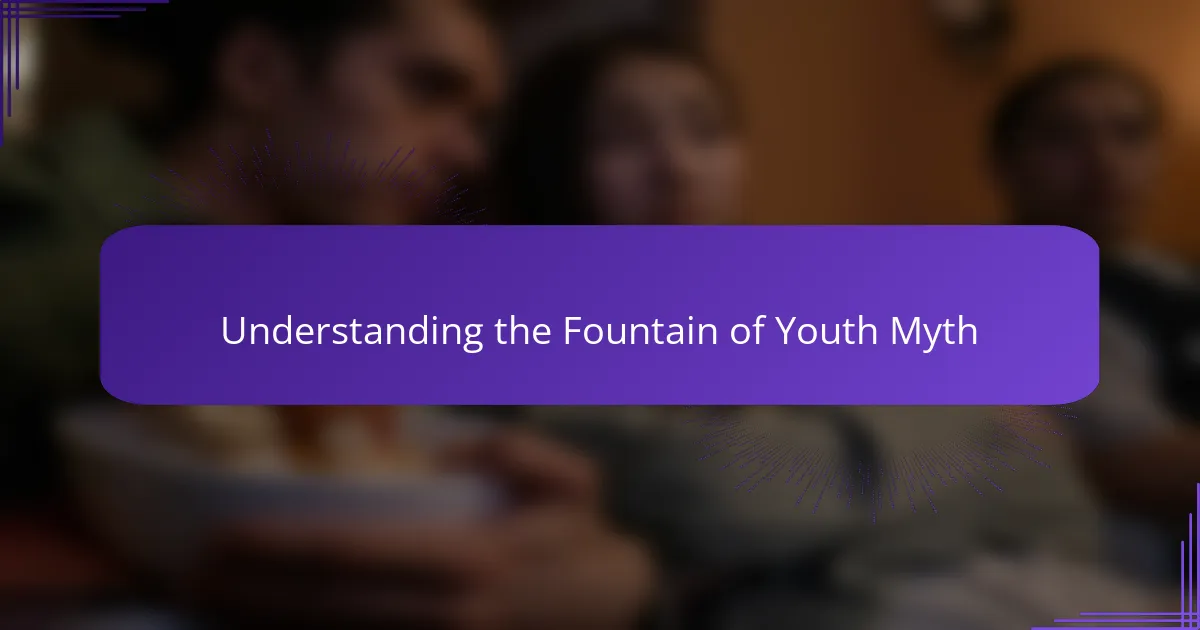
Understanding the Fountain of Youth Myth
The idea of a magical spring that grants eternal youth has fascinated humanity for centuries. I often wonder why the concept of the Fountain of Youth holds such power over our imaginations—is it the universal fear of aging or the hope of endless possibility? From ancient tales to explorers’ quests, this myth seems to capture our deepest desire to defy time.
When I first stumbled upon the stories of Ponce de León searching for this elusive spring, I felt a mix of intrigue and skepticism. How could such a simple legend inspire real-life adventures and historical myths? It made me realize that the Fountain of Youth is less about literal water and more about our collective yearning for renewal and immortality.
Interestingly, many versions of the myth appear across different cultures, each adding its unique twist. This diversity suggests that the Fountain of Youth is not just a fantasy but a symbolic reflection of human hope. Have you ever thought about what eternal youth would mean to you personally? For me, it’s as much about preserving memories and vitality as it is about resisting the inevitable changes time brings.
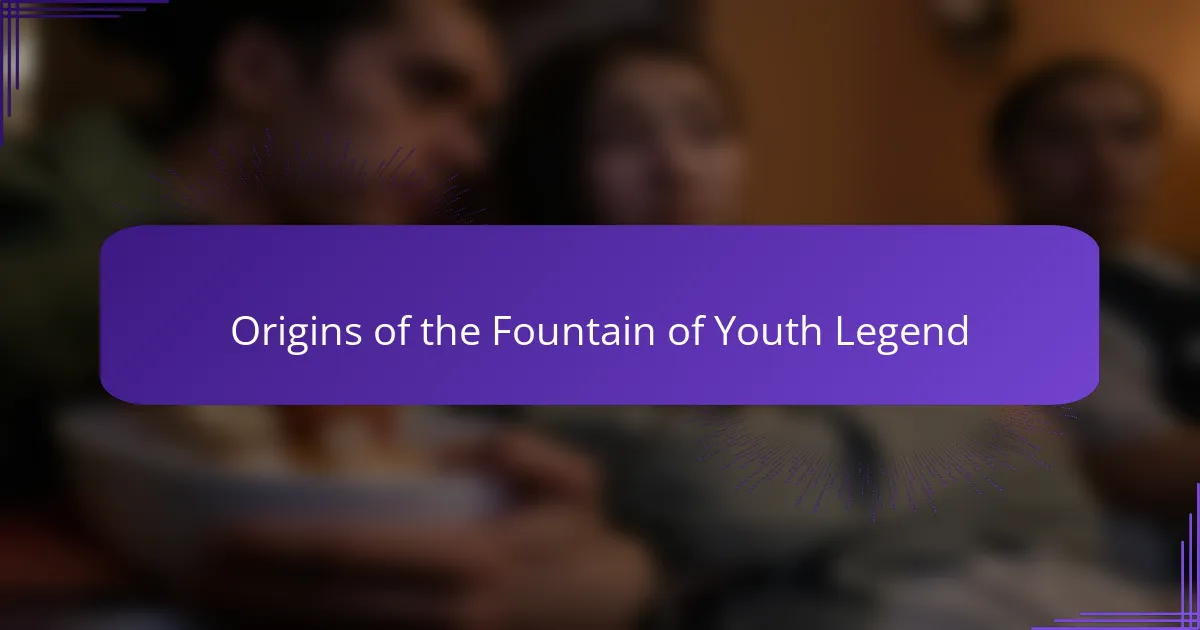
Origins of the Fountain of Youth Legend
The origins of the Fountain of Youth legend are as fascinating as the myth itself. I was surprised to learn that stories of life-giving waters stretch back to ancient civilizations like the Greeks and Romans, who spoke of enchanted springs with rejuvenating powers. It makes me wonder—did early humans dream of immortality in a way that still speaks to us today?
When I dug deeper, I found that the Spanish explorer Juan Ponce de León is often credited with popularizing the search for the Fountain of Youth during his expeditions in the 16th century. Honestly, the fact that a real person’s quest became woven into folklore shows how myths can grow from both imagination and historical events. Have you ever chased a dream that felt just within reach but remained elusive?
What struck me most is how the myth blends fact and fantasy, tied to human hopes and fears about aging. Could it be that the legend persists because it taps into a universal desire—to reclaim lost youth and vitality? This blend of mystery and meaning is probably why the Fountain of Youth still captivates our minds, centuries later.
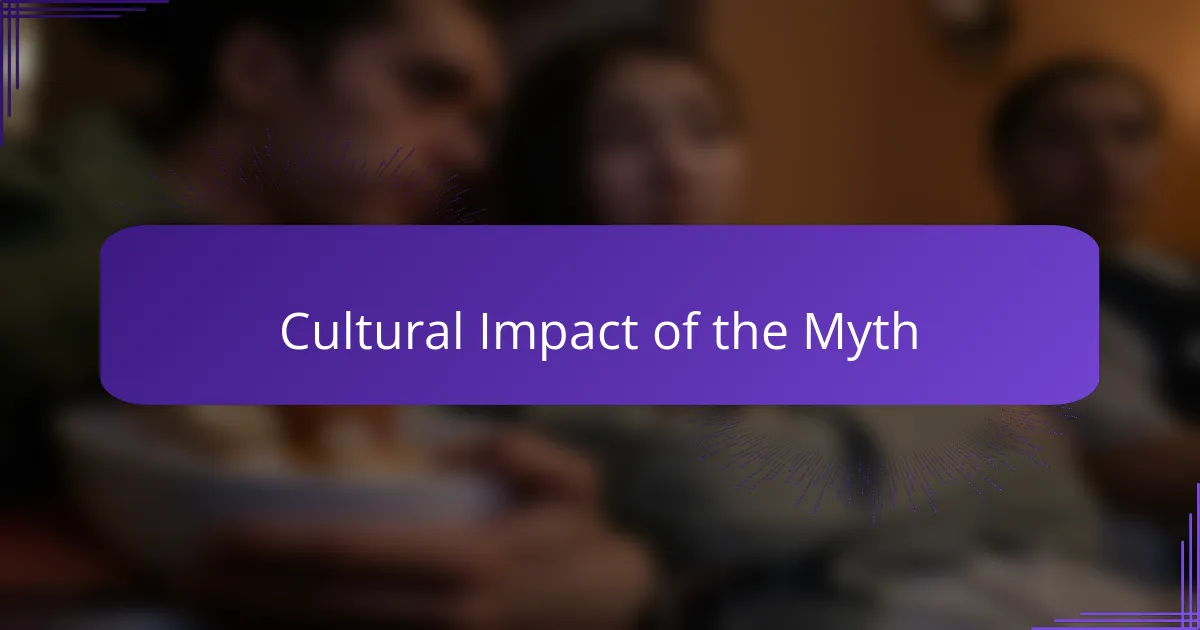
Cultural Impact of the Myth
The myth of the Fountain of Youth has clearly shaped literature, art, and even popular culture in ways that still resonate today. I remember seeing countless films and books where characters chase after this elusive spring, reflecting our deep-rooted fascination with overcoming aging. It’s interesting how this quest for eternal youth often symbolizes a broader search for meaning and renewal.
On a more personal note, I’ve noticed how the myth influences our everyday conversations about beauty and longevity. Have you ever caught yourself wishing for a way to turn back time after a tough day? The Fountain of Youth, in a way, has become a metaphor for our hope to preserve vitality and reclaim lost moments, which says a lot about human nature and how we cope with aging.
What fascinates me most is how this legend bridges cultures and generations, showing up in stories from the Americas to Asia. This universality suggests that the desire to remain youthful isn’t just a modern obsession but a timeless part of being human. Isn’t it remarkable that a simple myth continues to inspire dreams and even scientific pursuits to unlock the secrets of aging?
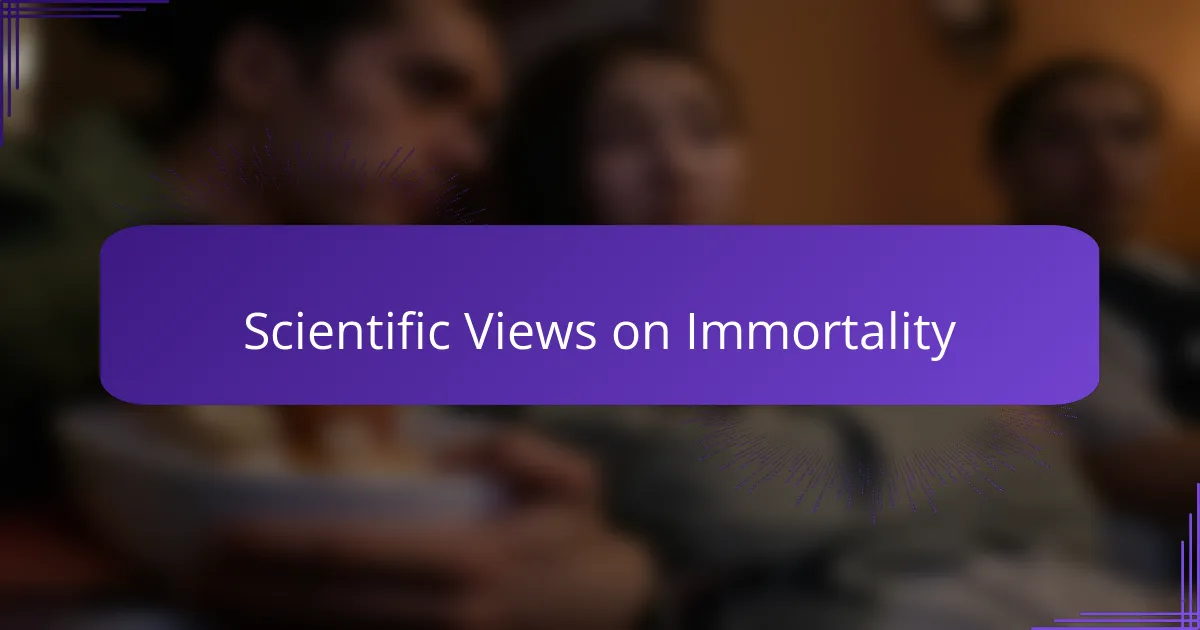
Scientific Views on Immortality
Science approaches immortality with a mix of curiosity and caution. I find it fascinating that while the idea of living forever captivates many, researchers mostly focus on extending healthy lifespans rather than achieving true immortality. Have you ever wondered why no matter how advanced science gets, aging still seems inevitable?
From my perspective, the study of aging—known as gerontology—reveals that our bodies are wired to wear down over time due to genetic and environmental factors. I’ve read about experiments aiming to slow cellular degradation or repair DNA damage, but complete immortality remains out of reach. Still, it’s intriguing to consider how far we might push the boundaries of life with future breakthroughs.
What struck me personally is the ethical dilemmas scientists face when discussing immortality. If we could live forever, how would that change society, relationships, and our sense of purpose? These questions make the scientific quest for eternal life as complex and profound as the myths that inspired it in the first place.
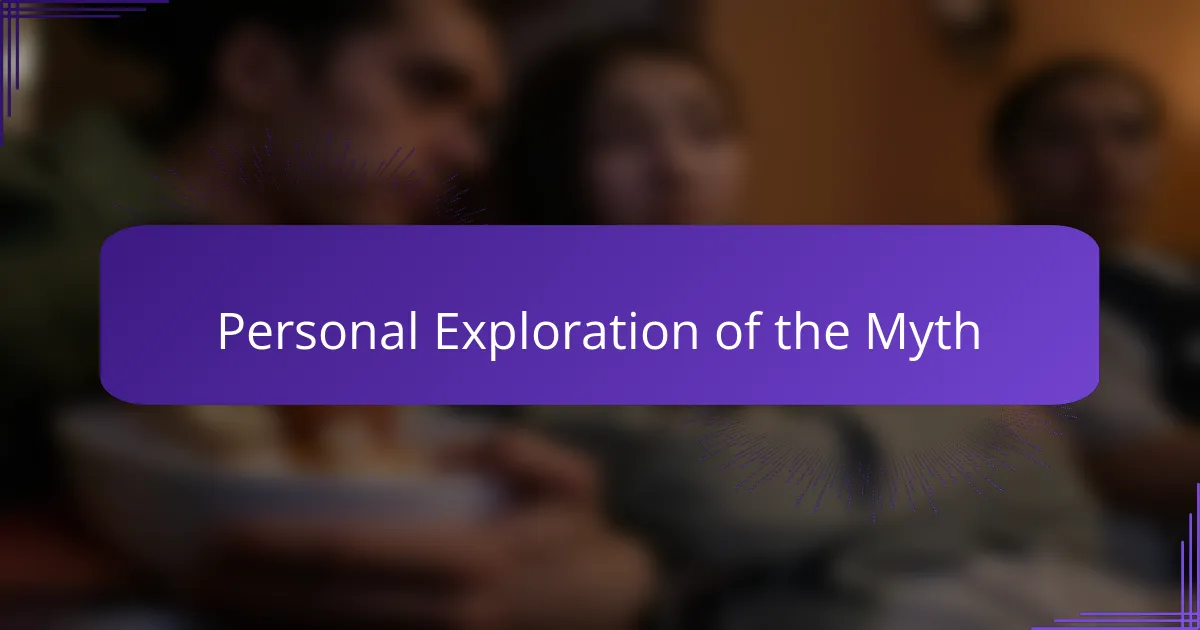
Personal Exploration of the Myth
Exploring the Fountain of Youth myth on a personal level felt like diving into a pool of both wonder and skepticism. I found myself questioning whether the allure of eternal youth is really about beating time or simply about hoping for a fresh start when life gets overwhelming. Have you ever caught yourself imagining what it would be like to pause or rewind your own aging process?
As I delved deeper into various tales and interpretations, I noticed how the myth mirrors my own struggles with change and loss. It’s as if the Fountain of Youth represents more than just physical youth—it symbolizes resilience and the desire to hold onto what makes us feel alive. In moments when I’ve faced life’s uncertainties, that idea offers a strange comfort, don’t you think?
What surprised me most during this exploration was how personal the myth became, almost like a conversation with my own hopes and fears. It made me realize that searching for eternal youth might be less about water and more about the deeper human need to find meaning in the passage of time. How do you think this myth reflects your own relationship with aging and change?

Paranormal Encounters and Experiences
I’ve heard stories from people who claim to have felt an otherworldly presence near places linked to the Fountain of Youth legend. One friend once described a sudden chill and a whisper of voices while exploring a supposedly enchanted spring—it made me wonder if these myths carry echoes from beyond our understanding. Have you ever experienced something that felt too strange to simply dismiss?
In my own encounters with the paranormal during this exploration, I sensed moments where time seemed to warp—a fleeting feeling that youth, or at least something like it, might be slipping through the cracks. It’s hard to explain, but these brush-ins with the unexplainable made the myth feel less like a distant fantasy and more like a living mystery. What do you think it would mean to truly “touch” that legend?
What fascinates me most is the way these experiences blur the line between reality and myth. Paranormal phenomena tied to the Fountain of Youth suggest that perhaps eternal youth isn’t just a metaphor but a dimension waiting to be glimpsed. Have you ever questioned where myth ends and reality begins? For me, these encounters are a reminder that some mysteries invite us to keep searching, even when answers feel just out of reach.
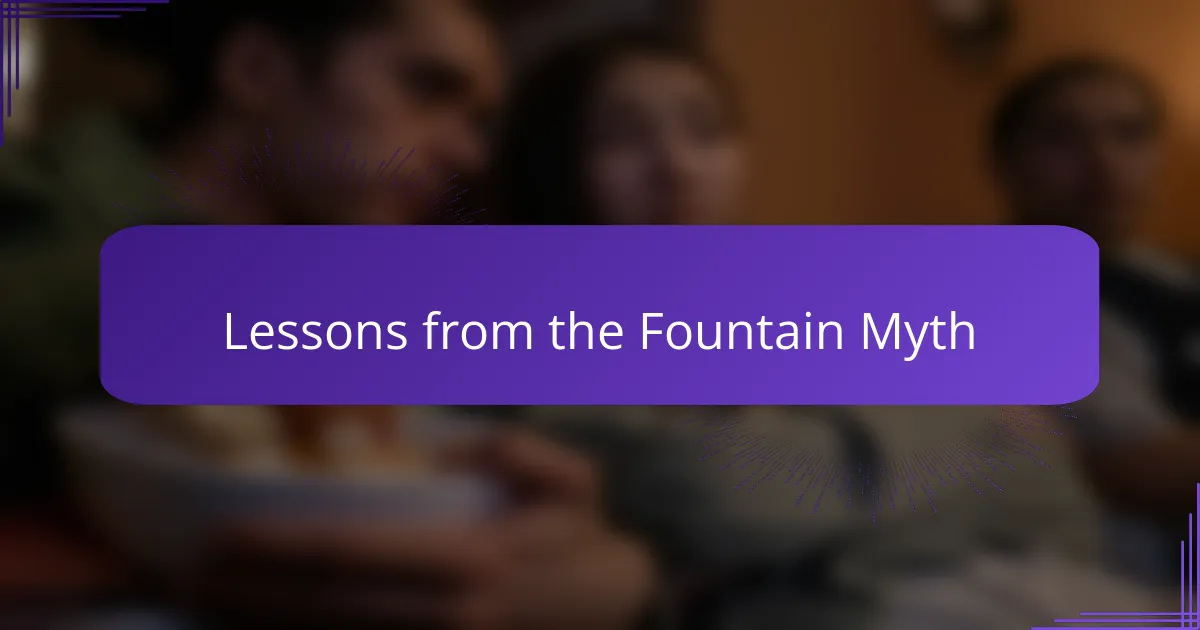
Lessons from the Fountain Myth
Thinking about the lessons from the Fountain of Youth myth, I realize it teaches us more about acceptance than defiance. After all, the quest itself reflects a deep human struggle with aging and change—something I’ve grappled with personally. Have you ever noticed how chasing eternal youth can sometimes blind us to the beauty in growing older?
Another insight I gleaned is how the myth invites us to reconsider what “youth” truly means. Is it just about physical vitality, or could it be about a youthful spirit—curiosity, hope, resilience? For me, embracing that inner youth feels like the truest form of immortality, something no water can grant but everyone can cultivate.
Finally, the myth cautions against obsession. I think it reminds us that the desire to stop time can lead to frustration or missed moments. When I’ve felt caught in that trap, it was only by letting go and appreciating the present that I found peace. Do you think the Fountain serves more as a metaphorical guide than a literal promise?